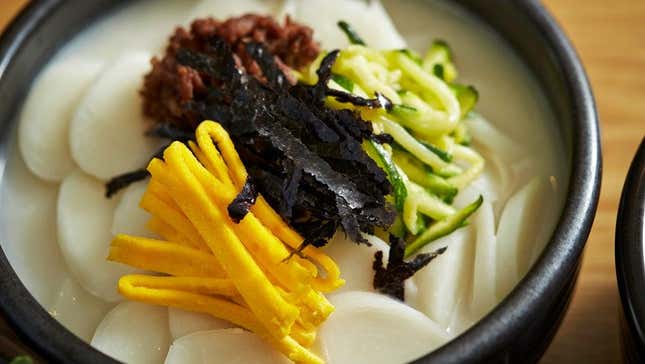
Lunar New Year begins January 22, and in Korea, that means it’s time for a huge celebration. The holiday, known as Seollal, goes on for three whole days. It’s focused on family, so during this time you’ll find a lot of Koreans traveling to see each other to celebrate. Families will typically play games, and the elder generations will, in exchange for well wishes and a bow, give money to the younger ones (a tradition called sebae)—and all of this is done, of course, over food. As everyone enjoys each other’s company, one particular dish can almost always be found on the table.
What is tteokguk?
Tteokguk is a simple soup composed of sliced rice cake ovals in meat broth, most commonly beef-based. It’s dressed just as simply, with strips of omelet, seaweed, green onions, and sometimes a little bit of beef. The mild savory flavor and the hearty chew of the rice cakes make this the ultimate bowl of comfort food. Sometimes people will add meat-filled mandu, or dumplings, to the bowl, as my family does, but it’s a filling soup either way.
Rice used to be a scarce commodity in Korea and was only affordable for the wealthy, so this seemingly humble rice cake soup was, for most people, traditionally reserved for special occasions. In the modern era, tteokguk can be enjoyed year-round; many Korean restaurants in the United States feature it on the menu since, as I mentioned, it’s a pretty comforting dish. In fact, I’d put it right up there with chicken noodle soup.
The significance of tteokguk
I grew up eating tteokguk, and you’ll probably hear the same thing from a lot of first generation Korean-Americans. Sitting down to a bowl on New Year’s Day is just what you do, and it’s just as much a part of New Year’s celebrations as popping a bottle of bubbly at midnight.
My family has changed up its own rituals a little. We’ve moved our New Year’s celebrations, typically reserved for Seollal, to the first day of January instead. It’s just easier for everyone to get together, since that’s when many of us are already off work and therefore don’t have to ask for extra vacation days. We still practice the same traditions like sebae, wishing our aunts and uncles to have a good year, and we catch up after months apart.
Unfortunately, we don’t get to celebrate the new year for three whole days; we keep it a relatively brief one-day gathering. But as soon as the tteokguk is served, it’s that one time each year when my entire extended family gets to sit, enjoy each other’s company, and take on the year with a full stomach. You can expect that a lot of Korean people across the world will be coming together to do just that in the coming days—but no matter who you are, you should plan on eating some tteokguk too. Happy New Year, everyone.